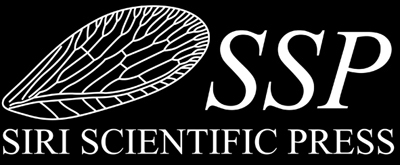SSP founder receives Marsh Award for Palaeontology
Posted by David Penney on
Well, we must be doing something right here at Siri Scientific Press, as it is a great pleasure to announce that founder, Dr David Penney, was awarded the Marsh Award for Palaeontology 2019 at a formal ceremony held at the Natural History Museum, London on 13 December.

David Penney receiving the award from John Bennett
The Marsh Awards recognise unsung heroes who have made a major contribution to the promotion of palaeontology, mineralogy or earth sciences.
At the event, a short biography of David was read out as follows:
"David was born in Manchester in 1968, and like most children, he was dinosaur obsessed. His favourite book included scenes of a dinosaur excavation and this was exactly what he wanted to do, so he asked his mum where he could find dinosaurs for real. She told him that those in the book came from North America and that it was too far to go. He was devastated … he needed to engage with something physical, beyond the pages of a book, but this was back in the 1970s well before the days of regular air travel … and he was only 8-years-old. He soon found his childhood curiosity satiated with the myriad of bugs and spiders in his back garden. Fossils were now well and truly a thing of his past and he had no interest in them!
Fast forward 18 years to 1994 and he had just been awarded with a BSc in Zoology at the University of Manchester and was about to embark on a PhD researching parasite immunology. That was, until a lecturer in Earth Sciences who he had never spoken to before called him into his office. He was an expert in fossil spiders preserved in rock and was aware of David's long-standing interest in spiders because he was the President of the British Arachnological Society, of which David had been a member for many years. It was also one year after the first Jurassic Park movie had been released, so fossil inclusions preserved in amber were kind of 'sexy' in research terms at that time … and so it was that David was offered a funded PhD position studying fossil spiders preserved in amber. Consequently, he considers himself an “accidental” palaeontologist … he just happened to be in the right place at the right time!
He was awarded my PhD in 1999 and just 3 years ago was awarded a higher doctorate, a DSc, based on almost 25 years of research. There have been many highlights, including demonstrating extinction resistance of spiders through the K/T event, co-radiation of spiders and their insect prey, and being at the forefront of applying computed tomography and the application of next generation DNA sequencing techniques to amber fossils. In 2004 he visited the Royal Tyrell Museum in the badlands of Canada, where some of the most spectacular dinosaur finds have been made. He was there to study their amber collection, but during his stay he got to visit a real dinosaur dig site … his childhood dream had eventually come true!
Unfortunately, he found the politics of academia rather unsavoury, so for the past 15 years most of his research has been done independently, albeit with an honorary affiliation to the University of Manchester, up until a year or so ago. This allowed him to pursue his own research interests and also to develop Siri Scientific Press, which he set up as a specialist publisher of palaeontology and entomology books back in 2008, with the aim of publishing books at the interface of academia and general public interest. The interest of the public audience should not be underestimated when it comes to our academic output. To give an example, in 2010, David co-authored a computed tomography study of a fossil spider preserved in 50 million year old Baltic amber. They included an online (Youtube) supporting video of the remarkable reconstruction. As of last week, the video has had 191,000 views (which very roughly equates to 55 views per day for EVERY day, since it was posted online almost 10 years ago. By contrast, the paper has been cited a mere 31 times. This 8-page paper is held behind a £35.00 paywall by the journal publisher, whereas his 128-page hardback book on fossil spiders has a retail price of just £32.00. The fact that Siri Scientific Press books get excellent reviews in scientific journals and also via public outlets such as Amazon indicates that he is achieving his objective of catering to both academic and public audiences.
He has now published more than 40 titles, half of which are devoted to palaeontology and David has no doubt that some of these books will be the inspiration for at least some future professional palaeontologists. It is also worth noting that three Siri Scientific Press authors have been past recipients of the Marsh Award: Dean Lomax in 2015, author of Dinosaurs of the British Isles, William Blows in 2016, author of British Polacanthid Dinosaurs and Dr David Green for Mineralogy and who co-authored Fossils in Amber with David Penney. David is therefore extremely happy to accept this award and join these researchers and the other esteemed recipients of the Marsh Award for Palaeontology."
The story was covered by the local media in David's home town of Rochdale: https://www.rochdaleonline.co.uk/news-features/2/news-headlines/131562/rochdale-palaeontologist-to-receive-the-natural-history-museums-2019-marsh-award-for-palaeontology
More information about the award can be seen by clicking here
Share this post
- 1 comment
- Tags: Book awards, Events, Media, News, Prize winners
1 comment

Congratulations on the award and keep up the good work.